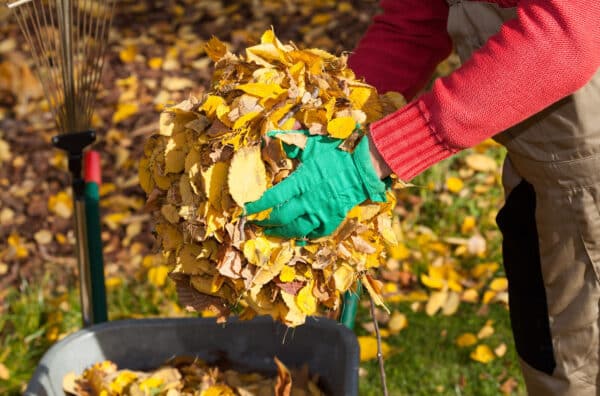Fall Yard Clean Up Tips
If you’ve ever overlooked fall yard clean up, you probably regretted it come spring! Taking the time now makes life much easier in the spring, AND it’s better for the health of your lawn and garden. With these lawn and garden clean up tips, you’ll be better prepared for next season.
Fall Yard Clean Up
- Adjust lawn mower blade. Gradually start lowering your mowing height once the grass growth starts to slow down or if taller grass is making leaf clean up difficult.
- Take care of leaves. Don’t allow leaves to accumulate in piles that would smother the lawn. Instead, mow leaves into the lawn. Leaf litter improves the soil by providing organic matter and necessary nutrients. So, there’s no need to be a perfectionist! Leave leaf litter to feed worms, fungi, and soil bacteria. Just don’t leave thick layers of matted leaves on your lawn, as this blocks oxygen to the soil and invites disease.
- You can also use leaves as a natural mulch for your garden. Mow over them multiple times to cut them up and then rake them back into your garden and shrub beds to protect your plants over the winter. If you have the space, you can keep a few piles of leaves in an out-of-the-way place to provide shelter for overwintering pollinators, beneficial insects, and wildlife. Use these piles to create leaf compost for the following spring.
- Water if needed. Dry conditions in the fall will affect lawn health. You want the grass and other plants to be strong going into the winter.
- Winterize. Lawn care experts and agricultural studies agree: a winterizer application is an essential fertilizer application if you want to have a lush, healthy lawn come spring. Read more about Winterizing here.
- MOVE YOUR LIQUID PRODUCTS TO A WARMER PLACE. Most liquid fertilizers and soil amendments need to be stored in temperatures over 40 degrees, so it is time to move your products out of the shed or other unprotected area and put them in a warmer place. Also, be sure the cap is on tight!
Fall Garden Bed Clean Up
- Remove any spent plants and debris. If you notice any diseased or bug-infested plants, be sure to dispose of them in the trash, never add them to compost.
- Weed one last time! Leaving just one weed to mature can produce hundreds of seeds to overpower your garden next season. If your soil is hard and dry, watering it a few hours before you begin will loosen the soil and make the task much easier.
- Put tools away. Remove, clean, and store any tools and equipment you may have left out during the growing season. Clean, sand, and oil your garden tools (if needed) before storing them for the winter. Turn off the water to the hose and drain it completely if you’re in an area where leftover water could freeze.
- Remove cages, stakes, or trellises. Wash off any soil and store in a garden shed or garage. Likewise, bring ceramic and clay pots inside, or they may crack in freezing temperatures. Don’t stack pots; it’s hard to get them unstuck in the spring.
- MOVE YOUR LIQUID PRODUCTS TO A WARMER PLACE. Same as with the lawn care tips above! Protect your investment by storing it properly over the winter. Be sure to keep them accessible, though; in our next blog, we’ll cover dormant feeding of trees and shrubs!
There’s no need to feel overwhelmed – we’re always here to guide you and provide the products you need to effortlessly achieve your dream lawn and garden!



